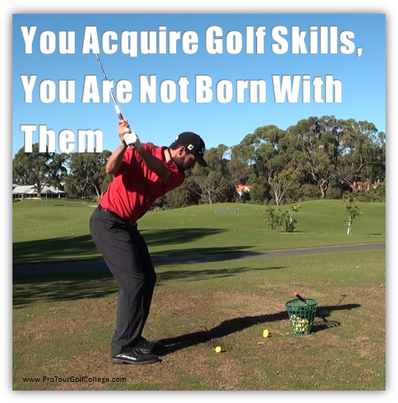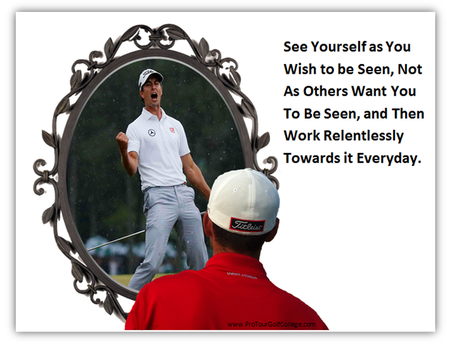So isn't it about time we start talking more about what really makes golfers great players, and stop using the word 'talent' so flippantly, which as I've said before is a convenient way of saying “I’m not sure why this guy or girl plays better than everyone else, so let’s just call it talent”. I have yet to meet someone who was born a golfer. I have met many who were born of golfing parents, but as far as I know there are no genes identified as yet that we could call golf genes. Ben Hogan was born of a black smith; Jack Nicklaus was born of a chemist; Bobby Jones was born of an attorney, and Tiger Woods was born of a retired military man. Not one of them was born with a special gene that gave them the ability to play golf; it was simply an acquired set of skills that they have executed in such a way that they achieved more success than many who have played. It's something they got really good at. Not unlike famous people who play music, toss or kick footballs, or run around tracks at the Olympics. So isn't it about time we start talking more about what really makes golfers great players, and stop using the word 'talent' so flippantly, which as I've said before is a convenient way of saying “I’m not sure why this guy or girl plays better than everyone else, so let’s just call it talent”. Talent is a helpful word for describing outcomes that seem unusual or outstanding, but so does the word excellence. Every golfer has experienced excellence at some point of time in their golfing experience, and there are many excellent golfers playing amateur and professional golf, but there is only ever one winner of a tournament at a time. Here's and interesting question. If someone can win more than one time in a year does that make him/her more talented than everyone else in the field? Was it talent that got them over the line, or a lower competitive score average over 4 rounds that did it? What about when they are not winning, or when they are completely out of form or how about when they retire from playing? Are they still talented then. It's seems to be a very convenient word when things are going well. If all highly competent and competitive male and female golfers can chip, pitch, putt, hits greens in regulation and drive the ball from the tee with distance and accuracy then surely what really is at work here is not a question of whether that golfer has talent, but rather can they synchronize all these different skills to create a low score average over four days of competition? So I'm offering you two simple choices for you to consider going forward; 1. You can work on developing your talent for golf or 2. You can work on developing a lower golf score average in tournaments The first one for me is a little vague, don’t you think? The second is easier to understand. If you want to be a successful amateur or professional golfer then forget whether or not you possess the talent for golf success and start working on improving your golf skills to drive your golf scores lower. You acquire golf skills; you are not born with them. Remember this always.  But I hear you saying that you have been told many times that you “haven’t got what it takes”. Really; and the person that shared this wisdom with you would really know right? Have they done it themselves? Maybe they have, and maybe they haven’t. Maybe they failed to become successful at golf and are bitter and twisted about it. And even if they were a successful golfer, (whatever that means) does that mean that you don’t somehow possess the ability to acquire and develop the skills necessary to lower your score average and live your dream of becoming a successful golfer? Of course you can! Ability is aptitude, intelligence and skill. You can improve all of these traits as it relates to getting better at golf.
 Seriously, you can change the way you play if you can change how you see yourself in the context of top level golf. If you see yourself as someone who struggles to put the score on the board then this will manifest itself. If you get upset and angry and disappointed because of your poor play, then this particular strategy will hold you back. Realize that you are not alone with the disappointment. It is par for the course in golf, and especially so in top level amateur and professional golf. But instead of using it as a weapon against yourself, find the inspiration to see it as a way of getting better. No one plays this game perfectly. There’s no room for perfectionists in golf, just realists. This is a game of mistakes, and the real acquired skill of excellent golfers is in reducing the mistakes in each round they play. The skill of golf is to use all your golf skills to craft low golf scores. This is the reality of golf, and also the mind-set you need to develop. Remember it is extremely difficult to find the motivation from others to succeed in golf. It is your responsibility to find the inspiration to continually find ways to acquire and improve your golf skills.
Motivation resides within you, so dare to dream big, bold and inspiring visions of what life could be like for you. Dream without fear and reservation. Your dreams provide you with the inspiration to stretch yourself. No one can do this for you. But also; no one has the right to decide for you whether you will be a success in golf or not, it is entirely up to you. Never give anyone permission to decide your fate in golf, or anything else for that matter! Forget whether you have the talent to succeed in golf or not; find people who embrace your vision of what’s possible, and go to work on it every day by building a bridge from where you are to where you want to be. And if you make mistakes along the way then realize that you are human and mistakes are part of the journey to your success in golf. This is precisely what all that great golfers have done in the past, and I guarantee you that it will still be the formula for personal success in golf in the future. Lawrie Montague and David Milne - Pro Tour Golf College Your Success On Tour is Our Business Comments are closed.
|
Archives
June 2019
|
Proudly Supported By
Copyright © 2011 - 2018 Pro Tour Golf College
Website Managed By Golf Performance Media
All Rights Reserved
Website Managed By Golf Performance Media
All Rights Reserved




 RSS Feed
RSS Feed



